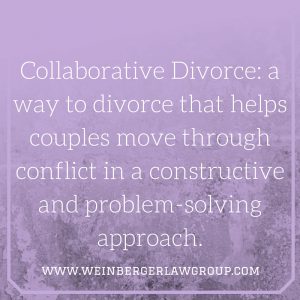Mediation, Collaborative Divorce or Litigation: What’s Right For Me?
 Much like how every marriage is different, every divorce in New Jersey is different too. You may have just come to terms with the fact that you are ready to file for divorce. Now what? Should you come to an agreement with your spouse? Are you anticipating a divorce trial? Are you and your soon-to-be ex on amicable terms or are you expecting a fight on each and every issue? Do you have very complex issues that need to be resolved?
Much like how every marriage is different, every divorce in New Jersey is different too. You may have just come to terms with the fact that you are ready to file for divorce. Now what? Should you come to an agreement with your spouse? Are you anticipating a divorce trial? Are you and your soon-to-be ex on amicable terms or are you expecting a fight on each and every issue? Do you have very complex issues that need to be resolved?
Depending on your circumstances, there are several possible ways to resolve your differences and become divorced in New Jersey. Which path is right for you? Let’s take a look.
Mediation
Mediation is most commonly used when a couple has decided to divorce and wants to control the process, rather than have the family court dictate terms. Working with a neutral third party mediator, divorcing spouses negotiate and work towards reaching agreements on the issues of their settlement, including child custody, child support and parenting time, alimony and how marital property such as homes or businesses is fairly divided, and all other issues. The mediator, through training and specialized knowledge helps the parties address these issues in the fairest and least stressful manner possible.
Collaborative Divorce
Collaborative divorce is a new trend in New Jersey family law. Collaborative divorce helps couples move through conflicts in a constructive and problem-solving approach. Attorneys trained in this approach guide clients in negotiating conflicts civilly. A major difference between collaborative methods and traditional litigated divorce is a pledge to reach an agreement outside of court. Both parties agree, in writing, to be part of a respectful process solving problems jointly to preserve the integrity of the family. This problem-solving approach requires open and honest communication while affording couples increased control over the outcome.
Litigation
The most traditional, and the most adversarial way to resolve your divorce is through litigation. Litigating your divorce means that the court will make some or all of the decisions for your family including custody, financial support and/or distribution of assets or debts. Typically, both parties are represented by counsel through the litigation process that, if not settled, will end up as a trial. Trials can be time consuming, emotionally draining and expensive. It is always suggested that couples attempt to work out at least some of their issues in an attempt to maintain as much control over their families and in order to keep legal costs low. Unfortunately, very hotly contested or complicated divorces are not always able to be worked out. In those cases, some sort of litigation is necessary in order to resolve the matter.
If you are contemplating divorce or if you or your spouse has already filed and you are uncertain which path to resolution of your case is best for you, please contact us to schedule your initial confidential consultation. We can help. Weinberger Divorce & Family Law Group, LLC’s skilled family law attorneys are experienced in all aspects of litigation, negotiation, mediation and collaborative divorce.


